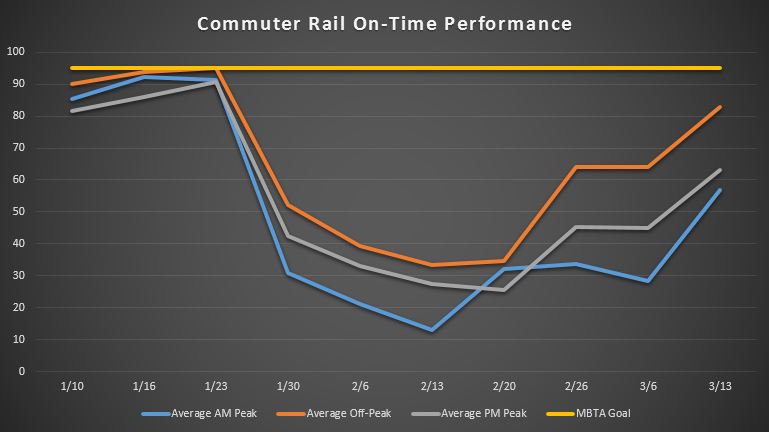Will MBTA Win Back Riders?
Yesterday the MBTA Board of Directors approved a plan to compensate T riders for dismal service since the storms of late January and February. It will take more than a few perks, however, to erase the months of devastation that the T’s inconsistency has caused for the average worker.
The plan calls for a single free day of rides on all forms of transportation on April 24th (the Friday of Massachusetts’ school vacation week), as well as a 15 percent reduction in monthly and weekly passes in the May.
The plan’s estimated $5 million cost comes at a time when the T’s apparently forgotten maintenance backlog approaches $7 billion and its out-of-control debt pushes $9 billion when interest is included. Instead of fretting over its popularity by offering a tiny consolation for months of inadequate service, the T should put all its resources towards its immediate needs.
The MBTA won’t win back the public’s confidence until the system is consistently operating at full capacity and performing its basic functions well. Besides, the small consolation that MBTA customers will receive is insulting in comparison to the hardships endured over the past two frigid months.
Yesterday the MBTA also released another week of commuter rail on-time performance figures, with no apparent change despite the continuation of a limited schedule. Even operating commuter rail at about three quarters capacity only results in an average on-time performance during morning commutes of 32.31 percent, down from 37.15 percent the previous week.
(AM peak hours are from 5-9 AM; PM peak hours are from 4-6:30 PM. MBTA on-time performance reports can be found on MassDot’s website)
It’s important to maintain perspective on these statistics. A train is considered late if it is any more than five minutes late for a scheduled stop, but the MBTA doesn’t tell us that many of these trains are far later than that.
In older versions of the on-time performance reports, comprehensive monthly data on all modes of transportation was available in an easy-to-understand format, including an indication of which trains were five minutes, and ten minutes late. The new reports obfuscate by creating divisions based on time of day and leave out many details that used to be provided, including the number of trains that are more than ten minutes late.
Also missing from the new reports is updated ridership data. The MBTA may be trying to gain back lost riders with this discount initiative, but more substantial benefits would be necessary to meaningfully move the needle on ridership. It is essential to focus on pressing operational issues first.
It’s been three weeks since the last snowfall and the commuter rail cannot seem to stabilize its service. The lack of confidence robs commuters of critical working hours and businesses of essential customers. Further hits to the MBTA’s credibility or its reputation for transparency would be ill-advised.
Until the MBTA is able to correct its basic operational deficiencies, it shouldn’t be handing out gifts. Irresponsible fiscal prioritization like this is what led to the creation of a system defined by debt and overwhelming maintenance needs.
Commuters will only return to the MBTA’s struggling commuter rail system when it becomes reliable again. Until then, a day of free rides costing millions is another example of the MBTA throwing money at the problem from the wrong angle.
Scott Haller is a student at Northeastern University working at Pioneer Institute through the Co-op Program.


